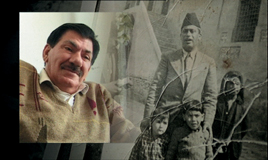|
Newest Reviews:
New Movies -
The Tunnel
V/H/S
The Tall Man
Mama Africa
Detention
Brake
Ted
Tomboy
Brownian Movement
Last Ride
[Rec]³: Genesis
Hara-Kiri: Death of a Samurai
Indie Game: The Movie
Abraham Lincoln: Vampire Hunter
Old Movies -
Touki Bouki: The Journey of the Hyena
Drums Along the Mohawk
The Chase
The Heiress
Show
People
The Strange Affair of Uncle Harry
Pitfall
Driftwood
Miracle Mile
The Great Flamarion
Dark Habits
Archives -
Recap: 2000,
2001, 2002,
2003, 2004
, 2005, 2006,
2007 , 2008
, 2009 ,
2010 , 2011 ,
2012
All reviews alphabetically
All reviews by star rating
All reviews by release year
Masterpieces
Screening Log
Links
FAQ
E-mail me
HOME
| |
Forget Baghdad: Jews and Arabs – The Iraqi Connection
(Samir, 2002)
 It’s not well-publicized, at least in
America, that about 25% of the Jews that migrated to help form the nation of
Israel were from Iraq, but that somewhat obscured fragment of world history
forms the subject of documentarian Samir’s Forget
Baghdad. Combining video montage, interviews with several émigrés,
personal observations and some eye opening found footage, the director probes
the history and current status of the “Mizrahim”, or Arab Jews. Starting
from his own experience as the son of an immigrant from Iraqi, Samir, who grew
up in Switzerland, decides to record a journey to Israel in which he questioned
several writers about their experiences before and since they made their
decision to leave their homeland of Iraq. What he finds is not exactly
revelatory, but still manages to surprise in bursts. The men describe their
feelings about how they were seen primarily as Jews in Iraq, but are looked at
first as Arabs in Israel. As outsiders in a country comprised mainly of exiles,
they describe feeling a good amount of pressure to conform to the customs and
languages of their new home and as evidence of those pressures Samir includes
footage from documentary and narrative films that seems to strongly advocate an
Israel made homogenous through interracial marriage. Tellingly, three of the
four writers now write primarily in Hebrew instead of their native Arabic, and,
perhaps more significantly, the lone holdout among the group describes a more
profound sort of alienation than the others do. It’s not well-publicized, at least in
America, that about 25% of the Jews that migrated to help form the nation of
Israel were from Iraq, but that somewhat obscured fragment of world history
forms the subject of documentarian Samir’s Forget
Baghdad. Combining video montage, interviews with several émigrés,
personal observations and some eye opening found footage, the director probes
the history and current status of the “Mizrahim”, or Arab Jews. Starting
from his own experience as the son of an immigrant from Iraqi, Samir, who grew
up in Switzerland, decides to record a journey to Israel in which he questioned
several writers about their experiences before and since they made their
decision to leave their homeland of Iraq. What he finds is not exactly
revelatory, but still manages to surprise in bursts. The men describe their
feelings about how they were seen primarily as Jews in Iraq, but are looked at
first as Arabs in Israel. As outsiders in a country comprised mainly of exiles,
they describe feeling a good amount of pressure to conform to the customs and
languages of their new home and as evidence of those pressures Samir includes
footage from documentary and narrative films that seems to strongly advocate an
Israel made homogenous through interracial marriage. Tellingly, three of the
four writers now write primarily in Hebrew instead of their native Arabic, and,
perhaps more significantly, the lone holdout among the group describes a more
profound sort of alienation than the others do.
 With even those who actually lived in
Iraq turning their backs somewhat on their roots, the choice to document their
transition to Israel becomes a sound one. As Samir interviews his participants,
he uses a split screen technique to show fragments of the past. The speakers’
mementos and pictures are shown alongside definitions of words that they use and
scraps of film footage to keep the interview sessions from feeling like a
procession of talking heads. When that split screen is used to show what seem
like randomly chosen close-ups of the speaker, this visually attractive montage
technique is a bit less effective. Since most of the interviewees seem content
to let the past and their heritage fade away, the visual representations of what
they’re giving up are significant and revealing. Still, Samir does his best to
make the audience understand the difficulty that these people face in sustaining
past identity when the Arabs are considered Israeli enemies. The men say that
discussing their problems as Arab Israelis feels taboo, since their race’s
problems can’t compare to the horrors of the Holocaust. Of course the plights
faced by four intelligent writers can’t be indicative of an entire group’s
experience, and there’s not really a convincing argument to be made that, as
writers, they’re necessarily the best storytellers, since a skilled
interviewer can extract wonderful stories from the least likely sources. Forget
Baghdad doesn’t really convey the plight of an entire people, however.
Rather, its attempts to convey the experience of these specific men seems an
attempt of the director to grow closer to an understanding of his own father and
his own obscured history.
With even those who actually lived in
Iraq turning their backs somewhat on their roots, the choice to document their
transition to Israel becomes a sound one. As Samir interviews his participants,
he uses a split screen technique to show fragments of the past. The speakers’
mementos and pictures are shown alongside definitions of words that they use and
scraps of film footage to keep the interview sessions from feeling like a
procession of talking heads. When that split screen is used to show what seem
like randomly chosen close-ups of the speaker, this visually attractive montage
technique is a bit less effective. Since most of the interviewees seem content
to let the past and their heritage fade away, the visual representations of what
they’re giving up are significant and revealing. Still, Samir does his best to
make the audience understand the difficulty that these people face in sustaining
past identity when the Arabs are considered Israeli enemies. The men say that
discussing their problems as Arab Israelis feels taboo, since their race’s
problems can’t compare to the horrors of the Holocaust. Of course the plights
faced by four intelligent writers can’t be indicative of an entire group’s
experience, and there’s not really a convincing argument to be made that, as
writers, they’re necessarily the best storytellers, since a skilled
interviewer can extract wonderful stories from the least likely sources. Forget
Baghdad doesn’t really convey the plight of an entire people, however.
Rather, its attempts to convey the experience of these specific men seems an
attempt of the director to grow closer to an understanding of his own father and
his own obscured history.
* * *
04-19-03
Jeremy Heilman
|